高中英语Unit 3 Amazing people 教案1牛津版必修二.doc
高中英语 Unit 3《Amazing People-word power》教案1 牛津译林版必修2

●Word powerBoys and girls, look at the screen, please. Can you tell us their jobs?( model, farmer, composer, driver, worker, teacher, air hostess and soldier) Word power in this unit deals with different expressions related to jobs.Try to increase your vocabulary by learning rules of word formations, such as adding suffixes to verbs, nouns and adjectives to form nouns. Practice and reinforce new vocabulary by doing the exercises. Try to acquaint yourselves with these different expressions and express opinions about your favorite jobs.Step 1: Brainstorming1. make a list of jobs you are familiar with. Then exchange your opinions aboutthe reasons for your favorite jobs.list of jobs__________________your favorite job _______________reasons for the favorite job______________2. Think of rules for word formation you know and try to give examples of theserules.For example:beauty→beautiful strange→strangely operate→operationcomfortable→uncomfortable speech→speechlessStep 2: Vocabulary learning1. Please look at the rules for word formation listed in the book. And tryyour best to think of more words that fit the rules. For example:+ er bank→banker compose→composer think→thinker+or educate→educator edit→editor sa il→s ailor+ ant assist→assistant serve→servant depend→dependant +ist art→artist chemistry→chemist science→scientist + ian music→musician history→historian technique→technician 2. Complete Part A first and then we we’ll check the answers to gether.3. Focus on Part B and try to guess the meanings of all the words. I’ll give you some explanations first:A principal is a person who is in charge of a university, college or school.A composer is a person who writes music.A sculptor is a person who has the talent of making solid objects representing people or animals out of stone, wood, clay, etc.An accountant is a person whose job is to keep and check financial accounts.4. Complete Part B together. Any different answers are welcome.Step 3: Vocabulary extension1. Focus on Part C and complete it individually. Don’t forget to give your reasons for the jobs you choose. You may provide as many reasons as possible.2. Please think about the different qualities we have to possess in order to take up a specific job. As you mentioned, you’d like to be a teacher. Then, in your opinion, what qualities should you possess in order to be a teacher? Do you think it’s easy to be a good teacher?3. Please read the article in Part A in Writing on page 103 in Workbook to learn how to write an article to describe a person. Then do Part B on the same page.Step 4: ExercisesA. Give the noun form of the following word to express the occupation or station.(1) examine (2) art (3) build (4) chemistry (5) conduct (6) dance(7) design (8) beg (9) dive (10) invent (11) translate (12) physics (13) lead (14) library (15) employ (16) piano (17) prison (18) sail(19) serve (20) discover (21) technique (22) win (23) visit (24) operateB. Choose the proper words for the blanks.(1) west, western, westernerSome _______ forms of greeting are not used in the East.A ______ may find that traveling in Asian counties is quite an experience.(2) compose, composer, compositionBeethoven was one of the greatest ______ in the world.He played a piano piece of his own _______.(3) advertise, advertiser, advertisementIf you want to sell your house, you may put an ______ in a newspaper. Factories often ______ their goods on TV or over the radio.An _______ always uses various means to attract the public attention.(4) create, creative, creation, creatorThe invention of steam engine led to the ______ of modern machine.It is essential to develop a student’s _______ ability.The people are the _______ of history.。
高中英语《unit3Amazingpeople》wordpower教案牛津译林版必修2
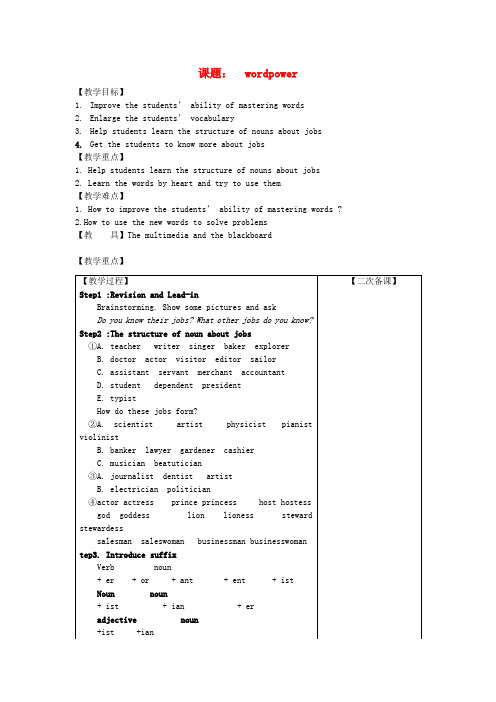
Step1 :Revision and Lead-in
Brainstorming. Show some pictures and ask
Do you know their jobs? What other jobs do you know?
Step2 :The structure of noun about jobs
【作业布置】
【教学后记】
tep3. Introduce suffix
Verb noun
+ er + or + ant + ent + ist
Noun noun
+ ist + ian + er
adjective noun
+ist +ian
How to show male or female
Step 4Complete part B
4.Get the students to know more about jobs
【教学重点】
1.Help students learn the structure of nouns about jobs
2. Learn the words by heart and try to use them
①A. teacher writer singer baker explorer
B. doctor actor visitor editor sailor
C. assiuntant
D. student dependent president
E. typist
How do these jobs form?
②A. scientist artist physicist pianist violinist
高中英语(unit3 Amazing people)Reading 1教案 牛津译林版必修2 教案

(4) 和,伴随
live with sb
(5) 虽然,尽管 fail with the best effort
【教学过程】
Reading: Language Points
1. discover
(1) discover vt. 发现(世界上原本就存在的事物) 6. pCrhersiesnttopher Columbus discovered America in 1492. (1) present adj. 出席的,在场的 ;现在h
(1) 因为,由于 fall ill with a fever / shake with cold /
jump with joy
(2) 与…同时
sail with the wind / change with seasons
(3) 同意,一致 agree with sb/ go with… 与…相符/配
江苏省江阴市成化高级中学高中英语《unit3 Amazing people》Reading 1 教案 牛 津译林版必修 2
【教学目标】 1. Help students improve their reading abilities. 2. Learn and master the following language points. 【教学重点】 1. Improve the students’ reading ability. 2. Enable the students understand the text better. 3. Get the students to master the tenses used in the passage. 4. Develop their creative, and comprehensive abilities. 【教学难点】 1. How to improve the students’ reading ability. 2. The use of some useful expressions. 【教 具】The multimedia and the blackboard
牛津译林版高中英语必修二《Unit 3 Amazing people》Project 教案 1

牛津译林版高中英语必修二M2 U3 ProjectI. Teaching aims.1: To learn more about China's first astronaut YLW.2:To learn to collect key information from a passage to make a character poster.3:To learn to write a passage according to the other group’s poster in about 150 words after class. IV. Teaching designsPart I: Simple introduction.(1) Learn some information about a successful Canadian singer-Justin Bieber(2) Know of the characteristics of a character posterPart II:Dealing with the reading material.(1) Get some information about YLW.(2) Learn to get key information to make a poster.(3) Analyze the structure of a passage, getting preparations for the following writingafter class.(4) Apply different approaches to help students further understand the material, readingbetween or beyond the lines.Part III: Making a classroom poster.Group work.1. Read the reading material about two successful persons ---Mo Yan and Jobs.2. Get key information according to the instructions.3. Work together to make a poster.4. Share the information each group gets to make all the students informed of these twosuccessful persons.Part IV: Critical thinking and emotion incentiveLook at a problem from different angles:Which of the following is the most important for success? Why?diligence(勤奋),creativity, luck, chance, optimism, interest, devotion,willpower, attitude...Part III HomeworkRefer to the classroom poster and write a passage about Mo Yan or Jobs in about 150 words according to the other group’s poster after class.1。
高中英语 Unit 3(Amazing People-welcome)教案1 牛津译林版必修2 教案
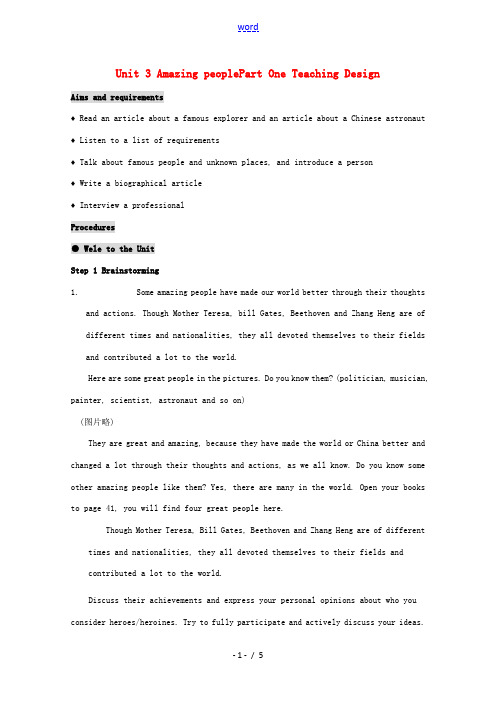
Unit 3 Amazing peoplePart One Teaching DesignAims and requirements♦ Read an article about a famous explorer and an article about a Chinese astronaut ♦ Listen to a list of requirements♦ Talk about famous people and unknown places, and introduce a person♦ Write a biographical article♦ Interview a professionalProcedures● Wele to the UnitStep 1 Brainstorming1. Some amazing people have made our world better through their thoughtsand actions. Though Mother Teresa, bill Gates, Beethoven and Zhang Heng are of different times and nationalities, they all devoted themselves to their fields and contributed a lot to the world.Here are some great people in the pictures. Do you know them? (politician, musician, painter, scientist, astronaut and so on)(图片略)They are great and amazing, because they have made the world or China better and changed a lot through their thoughts and actions, as we all know. Do you know some other amazing people like them? Yes, there are many in the world. Open your books to page 41, you will find four great people here.Though Mother Teresa, Bill Gates, Beethoven and Zhang Heng are of different times and nationalities, they all devoted themselves to their fields andcontributed a lot to the world.Discuss their achievements and express your personal opinions about who you consider heroes/heroines. Try to fully participate and actively discuss your ideas.2. Read the instructions and focus on the four pictures. Try to think of information you know about each person. I’ll give you a brief introduction first.We are going to talk about four persons. Though they are of different nationalities living in different times, they have a lot in mon. What are the mon things they share? Try to find the answers by discussing each of the four pictures with your group. Mother TeresaWho was Mother Teresa? How much do you know about her?What contributions did Mother Teresa make to people?When was she awarded the Nobel Peace Prize?Do you think Mother Teresa set a good example for us to follow? Why?What can you learn from Mother Teresa?It is reported that after she died, about 400 important figures including queens, presidents, prime ministers and the former First Lady Hillary Clinton came to pay final tribute to her. Do you think she was worth respecting?Bill GatesWho is chairman of Microsoft Corporation and the worldwide leader in software? Do you agree Bill Gates has had a dramatic effect on the world of puter technology? Give your reasons.What other information have you got about him?Bill Gates and his wife set up a foundation focusing on improving global health. Is Bill Gates one of your heroes?BeethovenWhat would our world be like if we had no music?How about listening to a piece of music?Are you familiar with the melody? And your feeling?Who wrote it?From your point of view, was Beethoven an amazing person? Was he a musician by nature?Did Beethoven bee discouraged and frustrated when he became deaf?Do you think his role could be pared with Bill Gates?Zhang HengJust now we talked about amazing people from other countries. What about the great people in our country? Have you heard of Zhang Heng?How much do you know about him?What do you think of his invention?Is he worthy of being called an amazing person?All picturesWhat are the mon characteristics these four people share?What can we learn from them? Are they your heroes/heroines?Below are some famous sayings or quotes from these famous persons. Please match them.Beethoven Bill Gates Mother Teresa1. “O ne thing I love about this「decade」is this is a period where thereality is driving the expectation.”2. “…Music is neither old nor modern: it is either good or bad music,and the date at which it was written has no significance whatever. Dates and periods are of interest only to the student of musical history…”3. “The other day I dreamed that I was at the gates of heaven…And St.Peter said, “Go back to Earth, there are no slums up here.”Step 2: Sharing information1. Three or four of you form a group and discuss the three questionsplease.2. Please express your opinions on the three questions, especially onQuestions 2 and 3. Then talk about the effects of these people’s achie vements on our lives.3. After class please read Part B in Reading on page 101 in Workbook asyour homework to get some information about Albert Einstein, another great man.。
牛津译林版高中英语必修二Unit 3《Amazing people》(word power)教案
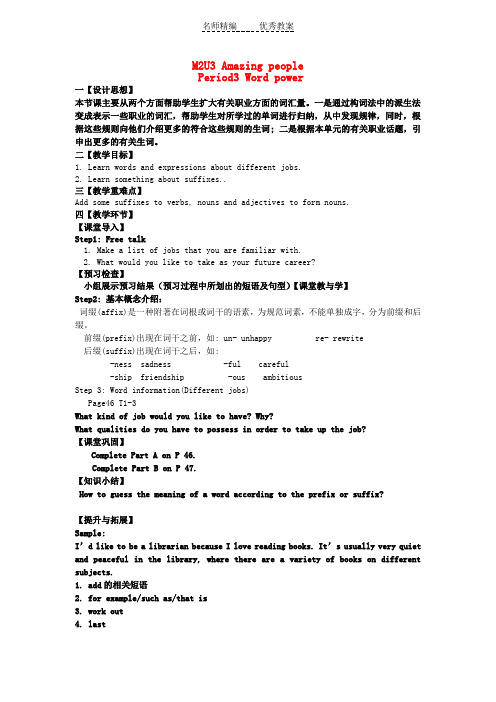
M2U3 Amazing peoplePeriod3 Word power一【设计思想】本节课主要从两个方面帮助学生扩大有关职业方面的词汇量。
一是通过构词法中的派生法变成表示一些职业的词汇,帮助学生对所学过的单词进行归纳,从中发现规律,同时,根据这些规则向他们介绍更多的符合这些规则的生词; 二是根据本单元的有关职业话题,引申出更多的有关生词。
二【教学目标】1. Learn words and expressions about different jobs.2. Learn something about suffixes..三【教学重难点】Add some suffixes to verbs, nouns and adjectives to form nouns.四【教学环节】【课堂导入】Step1: Free talk1. Make a list of jobs that you are familiar with.2. What would you like to take as your future career?【预习检查】小组展示预习结果(预习过程中所划出的短语及句型)【课堂教与学】Step2: 基本概念介绍:词缀(affix)是一种附著在词根或词干的语素,为规范词素,不能单独成字,分为前缀和后缀。
前缀(prefix)出现在词干之前,如: un- unhappy re- rewrite后缀(suffix)出现在词干之后,如:-ness sadness -ful careful-ship friendship -ous ambitiousStep 3: Word information(Different jobs)Page46 T1-3What kind of job would you like to have? Why?What qualities do you have to possess in order to take up the job?【课堂巩固】Complete Part A on P 46.Complete Part B on P 47.【知识小结】How to guess the meaning of a word according to the prefix or suffix?【提升与拓展】Sample:I’d like to be a librarian because I love reading books. It’s usually very quiet and peaceful in the library, where there are a variety of books on different subjects.1. add的相关短语2. for example/such as/that is3. work out4. last【课后预习】预习课本P48-51的内容,了解过去完成时的基本用法以及与现在完成时的区别。
高中英语必修2Unit3AmazingPeople教案

Module 2 Unit3 Amazing PeopleReading: The curse of the mummy一、课程标准描述:能从一般文字资料中获取主要信息,能利用上下文和句子结构猜测词义,能根据阅读目的使用不同的阅读策略。
二、教材分析教学内容:牛津高中英语(译林版)模块二高一上学期第三单元“Amazing People”第一课时Reading: The curse of the mummy教材分析:本课为模块二第三单元Reading教学的第一课时,第三单元主要讲述神秘的古代文明,而本课主要讲述埃及金字塔以及有关木乃伊的诅咒。
埃及金字塔及木乃伊是世人不断研究及探索的领域,也是我们学生非常感兴趣的领域。
本课主要帮助学生通过阅读这篇文章掌握阅读此类文章的阅读策略和阅读技巧,提高学生的阅读能力和综合运用语言的能力。
同时,通过本课教学,培养学生科学探究的精神。
教学目标:知识目标:1、了解一些有用的关于金字塔,埃及,探险的单词,词组表达:, adventurous curse, explorer, secretary, curious, preserve, coincidence.能力目标:1、通过对阅读策略的学习,掌握预测课文内容和获取学习的能力;2、培养学生的听、说、读、写能力、竞争意识和自主、合作、探究的意识。
情感目标:1、使学生了解神秘的世界,激发他们的求知欲;2、努力学习,学会用科学的方法来破解这一未解之谜学习策略:1、利用图片或者特定语境来学习新的单词和短语;2、采用激励性评价体制,激发学生的积极性和主动性;3、小组活动,通过小组成员合作学习,培养学生自主运用语言的能力。
教学重难点:1、掌握一些有用的关于金字塔,埃及,探险的单词,词组表达:adventurous, curse, , coincidence explorer, curious, preserve, secretary.2、通过对阅读策略的学习,掌握预测课文内容和获取学习的能力;由于本文是讲述著名探险家Howard Carter在埃及发现了古埃及KingTutankhamun之后,探险队21名成员先后神秘死亡。
牛津译林版高中英语必修二《Unit 3 Amazing people》(讲练)教学设计
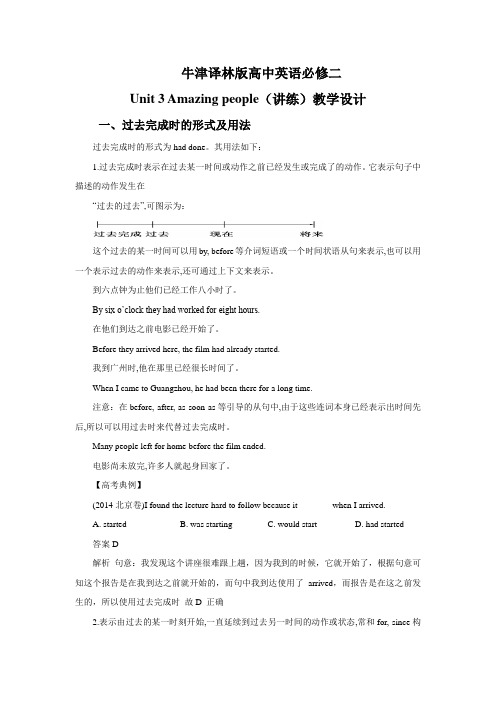
牛津译林版高中英语必修二Unit 3 Amazing people(讲练)教学设计一、过去完成时的形式及用法过去完成时的形式为had done。
其用法如下:1.过去完成时表示在过去某一时间或动作之前已经发生或完成了的动作。
它表示句子中描述的动作发生在“过去的过去”,可图示为:这个过去的某一时间可以用by, before等介词短语或一个时间状语从句来表示,也可以用一个表示过去的动作来表示,还可通过上下文来表示。
到六点钟为止他们已经工作八小时了。
By six o’clock they had worked for eight hours.在他们到达之前电影已经开始了。
Before they arrived here, the film had already started.我到广州时,他在那里已经很长时间了。
When I came to Guangzhou, he had been there for a long time.注意:在before, after, as soon as等引导的从句中,由于这些连词本身已经表示出时间先后,所以可以用过去时来代替过去完成时。
Many people left for home before the film ended.电影尚未放完,许多人就起身回家了。
【高考典例】(2014北京卷)I found the lecture hard to follow because it _______ when I arrived.A. startedB. was startingC. would startD. had started答案D解析句意:我发现这个讲座很难跟上趟,因为我到的时候,它就开始了,根据句意可知这个报告是在我到达之前就开始的,而句中我到达使用了arrived,而报告是在这之前发生的,所以使用过去完成时故D 正确2.表示由过去的某一时刻开始,一直延续到过去另一时间的动作或状态,常和for, since构成的时间状语连用当公交车来的时候,我在车站已等了20分钟。
牛津译林版必修二Unit 3《Amazing people》word教案1
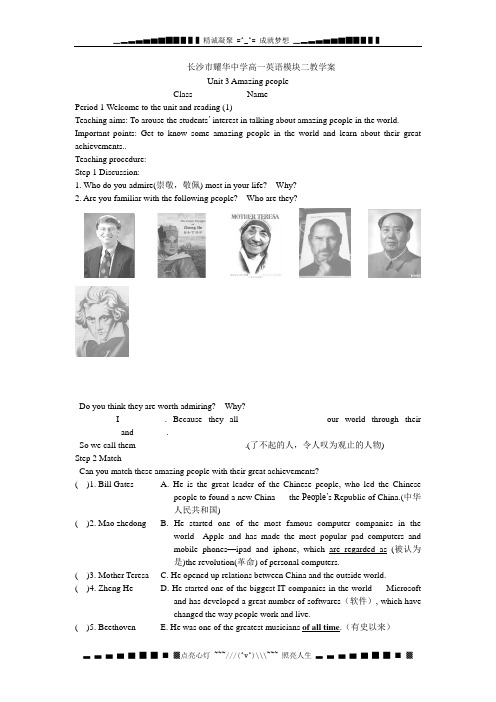
长沙市耀华中学高一英语模块二教学案Unit 3 Amazing peopleClass _________ Name _____________Period 1 Welcome to the unit and reading (1)Teaching aims: To arouse the students’ interest in talking about amazing people in the world. Important points: Get to know some amazing people in the world and learn about their great achievements..Teaching procedure:Step 1 Discussion:1. Who do you admire(崇敬,敬佩) most in your life? Why?2. Are you familiar with the following people? Who are they?__________ ____________ _____________ ____________ _____________ ____________Do you think they are worth admiring? Why?_______ I _________. Because they all _______ _________ our world through their __________ and _______.So we call them ___________ _____________.(了不起的人,令人叹为观止的人物)Step 2 MatchCan you match these amazing people with their great achievements?( )1. Bill Gates A. He is the great leader of the Chinese people, who led the Chinesepeople to found a new China---- the People’s Republic of China.(中华人民共和国)( )2. Mao zhedong B. He started one of the most famous computer companies in theworld---Apple and has made the most popular pad computers andmobile phones—ipad and iphone, which are regarded as (被认为是)the revolution(革命) of personal computers.( )3. Mother Teresa C. He opened up relations between China and the outside world.( )4. Zheng He D. He started one of the biggest IT companies in the world---- Microsoftand has developed a great number of softwares(软件), which havechanged the way people work and live.( )5. Beethoven E. He was one of the greatest musicians of all time.(有史以来)( )6. Steve Jobs F. She won a Nobel Peace Prize for her work among the poor people of India.Step 3 Discussion:Why are they able to make such great achievements? What do they have in common(共同的)? Pick out the common characters of these amazing people.( )1. Never give up ( )6. Overcome(克服) all the difficulties theymet( )zy and weak in their character(他们在品质上).( )7. They work only for themselves.( )3. Have made great contributions (做出巨大贡献)in different filelds( )8. Loved and respected by people( )4. Lack of wisdom and courage(缺乏智慧和勇气) ( )9. Have extrordinary persverance.(非凡的毅力)( )5. Have great aims (伟大的目标) and worked hardin order to achieve it ( )10. Changed our world through their thoughtsand actionsDo you want to become an amazing person? What should you do?Homework; Preview the passage on page 42 and 43.长沙市耀华中学高一英语模块二教学案Unit 3 Amazing peopleClass _________ Name _____________Period 2-3 ReadingTeaching aims: 1. To improve the students’ reading skill: How to predict information.2. To understand the main idea of the passage and detailed information by skimming andscanning.Important points: the main idea of the passage and detailed information.Step 1. Prediction.Now let’s get to know another amazing person.Please go through the first paragraph of the text on page 42 and 43 quickly and find out who is the amazing person mentioned in it.The amazing person mentioned in the text is _____________________, who is one of the most famous _____________in the ________________.What can you predict from the the title and the 1st paragraph the passage is about?The passage is about his amazing ____________________.Step 2 SkimmingSkim the passage and find out the answers to the following questions:1) What an amazing discovery did Howard Carter make?He discovered the ____________ of __________________________, which contained a lot of____________ , as well as the __________ of the king2) What happened to some of the team members after the tomb was opened?Some of the team members ________________.3) Have the explanations of “the curse of mummy” been fully accepted by people today?. _______, they __________.Step 3 ScanningRead the text again, more carefully and give the main idea of each paragraph:( ) P1 A.There’s a scientific reason why people died after entering the tomb. ( ) P2 B. Carter didn’t go to school and later became an explorer.( ) P3 C. Lord Carnarvon died after Carter had opened the tomb.( ) P4 D. Carter discovered the tomb of King Tutankhamun.( ) P5 E. A short introduction of Carter’s life story.( ) P6 F. The mystery of Tutankhamun’s tomb has never been fully explained. ( ) P7 G. More people died after Carter’s discovery.( ) P8 H. People keep wondering why so many people died and have suggested all kinds of explanations.Step 4 Detailed information:1. Howard Carter’s education:He _______ go to ____________, but learnt to _________ from his ___________3.The death of Carter’s teammates:Character Connection with Carter and the tomb How did he die?the bird Carter’s 1)________________ was 2)__________ by a 3)________ Lord Carnarvon Provided 4)___________ for Carter’s team. wasalso 5)__________ when the tomb was opened.6)_____________ with 7) ___________ George Gould Carn arvon’s 8)______, too 9)________ the tomb had a 10)_____________________Richard Bethell Carter’s 11)_________, entered the tomb as well died of 12)___________________ Arthur Mace Team member Not mentioned4. Different explanations of the death of Carter’s teammates:1) ___________________________ 2) ________________________ 3)_____________________________Conclusion: “The curse of the mummy” remains a _________________ to this day.5. Summary:Part 1(para1-3): Howard Carter’s _____________ and his _____________________Part 2(para4-5): ___________________after the discovery of the tomb.Part 3(para6-8): ________________________ about the deathsStep 5 useful phrases:Homework: complete Ex D and E on page 44 and 45.长沙市耀华中学高一英语模块二教学案Unit 3 Amazing peopleClass _________ Name _____________Period 4-5 Language pointsTeaching aims: 1.Encourage the students to improve their reading ability by focusing on language points.2.Learn how to use the key words and expressions which appearin the text.Teaching important points: the key words and expressions in the text.Teaching procedure:Step 1 Revision1. Check homework.2. Review the text on page 42 and 43 and fill in the blanks with the words in the passage. discovery, discoveries, mummy, riddle, however, died, treasure, explorer, puzzled, tomb, curse, explanationsHoward Carter, a well-known 1)______________, made many amazing 2)_______________ during his life.One of his most amazing discoveries is the 3)____________ of King Tutankhamun, where he not only found a great deal of 4)___________ but also the 5)___________ of the king.6)____________, a series of unfortunate things occurred shortly after the 7)____________ of the tomb----- his lucky pet bird and some of his teammates 8)____________ one by one, which 9)_____________ people all over the world. Different 10)_______________ spread among people. One of the most terrifying explanations was “the 11)__________ of the mummy”. But till today, “the curse of the mummy” remains a 12)_______________.Step 2 Language points:1. He was bright and curious about the world outside his hometown. (L 5-6)“curious” means “eager to learn / know”好奇的be curious about sth. 对……好奇be curious to do sth. 好奇地做某事curiously enough …奇怪的是,……(口语,常放句首)1) They __________ very ___________ ___________ (对……好奇)the people who lived in the island.2) He _____ always __________ ______ ________ ______ (好奇的去弄明白find out) how everything works.3) ____________ ______________, a year later exactly the same thing happened to me again.2. In 1891, at the age of 17, he set sail for Alexandria, Egypt. (L6-7)“set sail for” means “to travel to somewhere by boat”. 启航前往1) We ________ __________ from Dover ____________ Ostend. 我们乘船从Dover出发前往Ostend.2) My dream is that I _______ ______ ________ _______ Australia one day.我的梦想是有一天启航去到澳大利亚。
高中英语(Unit 3 Amazing people-短语与句型)教案 牛津版必修2 教案

湖南省衡南县第九中学高一英语《Unit 3 Amazing people-短语与句型》教案(必修二译林牛津版)1)during one’s life 在某人的一生中2)be curious to do sth 极想/好奇去做某事3)be curious about sth 对…好奇4)set sail for 启航去…5)the preserved bodies 保存的尸体6)be known as /for/ to 以…知名,出名7)more riches 更多的财宝8)be present to party 参加那个晚会9)be present at the meeting 出席会议10)present sb. with sth. 赠送某人某物11)present sth. to sb. 赠送某物给某人12)at present 目前,现在13) die of heart trouble 死于心脏病14)have sth. to do with 与…有关系/牵连15) the resting place of the dead 死人的安息地16) result in 引起(某种结果)17)result from 由…引起,原因是18) as a result 结果…(表示结果)19)as a result of 因…的原因(表示原因)20)in advance 提前;预先21) pay off 回报22) work as a nurse 当护士23)air race 飞行比赛24) go well 进展顺利25) World War One/ the First World War 第一次世界大战26) a great deal of money 大量的钱27)set foot on/in 踏上28)at full speed 全速29)receive warnings about 收到…的警告30)show sb. how to do sth. 示范给某人如何做某人31)die strangely 莫名其妙地死了32)in his thirties 在他三十多岁时33)make a note of 作…笔记34)be related to 与…有关系35)discourage sb from doing sth 使某人失去做某事的勇气36)take the first step towards 向…跨出第一步37)switch to 转向…38)thanks to 多亏;由于39)rare animals 珍惜动物40)communicate sb with…与…联系;交流41)make a dream a reality 使梦想成真42)a fighter pilot 战斗机飞行员43)talk of wanting to do 谈起想做…44)the subjects required to be an astronaut 当宇航员的必修课目45)survival skills 生存技能46)three out of the fourteen 十四个中的三个47)a qualified doctor 一个合格的医生48)be in control of oneself 控制自己49)go down in history 载入史册50)look up to sb. 尊敬某人51)live one’s dream 实现梦想52)spend five years being trained 花五年接受训练53)win over 战胜;争取过来54)win/ get a Nobel Prize 赢得/获得诺贝尔奖55)make…change (to sb): (对)…作改动56)change… into 转变成57)change… for 更换成,调换58)change for the better/ worse 向好的/坏的方面转变59)have a(n) good/bad effort on 对……有影响60)an adventurous holiday 惊险刺激的假日61)make an adventure 做一次冒险62)empty…of 把…从…空出63)be empty of 缺乏(少),没有64)a street empty of traffic 无人车往来的街道65)empty into 注入66)compare…to... 把…比作67)compare … with…与…作比较68)compare with/to 与…比较(过去分词作状语,意义一样)69)in comparison with 与…相比70)beyond/without comparison 无与伦比71)express sth. 表达某事72)express sth. to sb. 向某人表达……73)express best wishes 表达良好的祝愿74)an express highway 高速公路75)in the 90s 在90年代76)as well as 和…一样也(用来连接并列成分)77)have something to do with 与…有关78)have nothing to do with 与…无关79)have much to do with 与…有很大关系80)have little to do with 与…几乎没有关系81)pay off vi 回报;成功;vt. 还清(债款);付清工资解雇报复;惩罚82)pay back 偿还83)pay for 付…的贷款84)on/upon(doing)sth. 一…就…85)as soon as/once/the moment/minute/second/immediately/directly/instantly86)by coincidence= by chance 碰巧,由于巧合87)It’s a coincidence that…‥‥是巧合(偶然)88)disturb the peace 扰乱平静89)make the dream a reality 使梦想变为现实90)Live one’s dream实现梦想91)take sb. In orbit…使…进入轨道92)work towards 努力使…完成93)encourage sb to do sth 鼓励某人去做某事94)be encouraged by 被...鼓励,得到…鼓励95)picked from 从…选出来96)n ot only … but also不仅……而且97)prove sb. to be=prove that sb … 证明是。
高中英语 Unit 3《Amazing People-Grammar and Usage》教案1 牛津译林版必修2
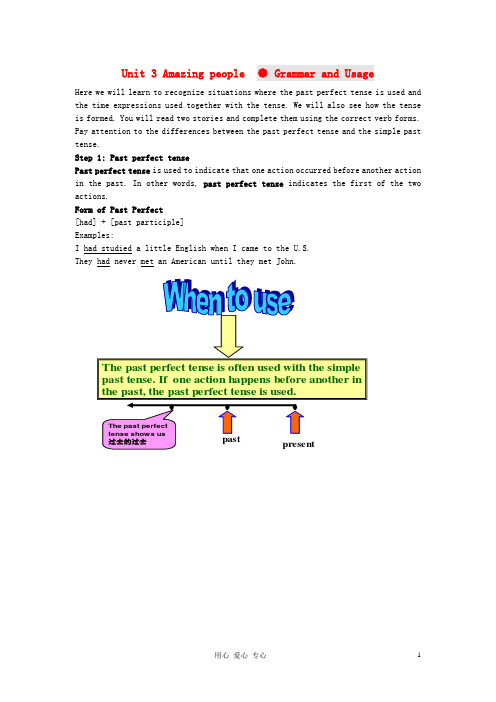
USE 1Completed Action Before Something inPastThe Past Perfect expresses the idea that something occurred before another action in the past. It can also show that something happened before a specific time in the past.Examples:I had never seen such a beautiful beach before I went to Kauai.Had you ever visited the U.S. before your trip in 1992?Yes, I had been to the U.S. once before in 1988. USE 2Duration Before Something in the Past(Non-continuous Verbs) With Non-progressive Verbs and some non-progressive uses of Mixed Verbs, we use the Past Perfect to show that something started in the past and continued up until another action in the past.Examples:We had had that car for ten years before it broke down.By the time Alex finished his studies, he had been in London for over eight years. IMPORTANT Specific Times with the Past PerfectUnlike the Present Perfect, it is possible to use specific time words or phrases with the Past Perfect. Although this is possible, it is usually not necessary.EXAMPLE:She had visited her Japanese relatives once in 1993 before she moved in with them in 1996.If the Past Perfect action did occur at a specific time, the Simple Past can be used instead of the Past Perfect when before or after is used in the sentence. The words before and after actually tell you what happens first so the Past Perfect is optional. Both sentences below are correct.EXAMPLE:She had visited her Japanese relatives once in 1993 before she moved in with them in 1996.She visited her Japanese relatives once in 1993 before she moved in with them in 1996.HOWEVERIf the Past Perfect action did not happen at a specific time, Past Perfect MUST be used at all times. Compare the two sentences below.EXAMPLE:She had never seen a bear before she moved to Alaska. CorrectShe never saw a bear before she moved to Alaska. Not CorrectACTIVE / PASSIVE FORMS of Past PerfectEXAMPLESGeorge had repaired many cars before he received his mechanics license. ACTIVE Many cars had been repaired by George before he received his mechanics license. PASSIVEStep 2: Practice1. Read Point 1 on page 48 to see which action happens first in the sentence given. Note that the past perfect tense is often used with the simple past tense. If one action happens before another in the past, the past perfect tense is used. So these two tenses are often used together.Look at the diagram in Point 1 first, and then read the example sentence.Note how the past perfect tense is used with the simple past tense.2. Read the following two sentences to see how the predicate is changed when the sentence is turned from the direct speech into the indirect speech.Toby said, “I will/shall not be in London next week.”Toby said that he would not be in London the next week.When we change the sentence that someone said using the present perfect tense in direct speech into indirect speech, the past perfect tense is used.“I have never visited the Great Pyramid, but I have read a lot about it,” he said to me.He told me that he had never visited the Great Pyramid, but he had read a lot about it.The time markers like by now and by the end of last year etc. can help us distinguish the two tenses.We have received more than ten letters from him by now.We had received five letters from him by the end of last year.When we talk about an action that began in the past and lasts until the present, we use the present perfect tense. When we talk about an action that ended at a time in the past, we use the past perfect tense.Step 5: Grammar execisesI. Relative items in recent years’ college entrance examinations:1.All morning as she waited for the medical report from the doctor, hernervousness______.(2003全国)A. has grownB. is growingC. grewD. had grown2.The news came as no surprise to me. I _______ for some time that the factorywas going to shut down.(2003北京)A. had knownB. knewC. have knownD. know3.I thought Jim would say something about his school report, but he _______ it.(2003上海)A. doesn’t mentionB. hadn’t mentionedC. didn’t mentionD.hasn’t mentioned4.I arrived late; I ______ the road to be so icy. (2004北京春招)A. wouldn’t expectB. haven’t expectedC. hadn’t expectedD.wasn’t expecting5.My mind wasn’t on what he was saying so I’m afraid I ______ half of it.(2004全国,30)A. was missingB. had missedC. will missD. missed6.The crazy fans _______ patiently for two hours, and they would wait till themovie star arrived.(2004重庆,22)A. were waitingB. had been waitingC. had waitedD. would wait7.He kept looking at her, wondering whether he ______ her somewhere.(2004 湖北,22)A. sawB. has seenC. seesD. had seen8.---George and Lucy got married last week. Did you go to their wedding?---No. I _______. Did they have a big wedding? (2004湖北,33)A. was not invitedB. have not been invitedC. hadn’t been invitedD.didn’t invite9. I ______ Bill this morning, but I ______ him since.A. have seen; haven’t seenB. saw; haven’t seenB. saw; didn’t see D. had seen; haven’t seen10. ---Dad, do you know I had long been looking forward to your staying with me forthe last weekend?---Sorry, son. I ______, but I was just too busy.A. had really wanted toB. have planned toC. have intended toD. hadhoped me to11. He _________ more that 5,000 English words when he entered the university atthe age of 15.(2005北京卷)A. has learnedB. would have learnedC. learnedD. had learned12. When the old man ______ to walk back to his house ,the sun _____ itself behindthe mountain. (2005湖北卷)A.started ;had already hidden B.had started ;had already hiddenC.had started ;was hiding D.was starting; hid13. The young girl sitting next to me on the plane was very nervous. She before.(2006广东)A. hasn't flownB. didn't flyC. hadn't flownD. wasn'tflying14. I was giving a talk to a large group of people, the same talk I_______ to a dozenother groups. (2006湖南)A. was givingB. am givingC. had givenD. have given15. John, a friend of mine, who got married only last week, spent $3,000 more thanhe _______ for the wedding. (2006全国II)A. will planB. has plannedC. would planD. had plannedII. Filling the blanks with proper tense.(Simple Past / Present Perfect / PastPerfect)1. When I (arrive) ______home last night, I discovered that Jane (prepare) ______abeautiful candle-lit dinner.2. Since I began acting, I (perform) ______in two plays, a television commercialand a TV drama. However, I (speak, never even) _______publicly before I came toHollywood in 1985.3. By the time I got to the office, the meeting (begin, already) ______without me.My boss (be) _____furious with me and I (be) ______fired.4. When I (turn) _____the radio on yesterday, I (hear) ______a song that was popularwhen I was in high school. I (hear, not) ______the song in years, and it (bring)_____back some great memories.5. When Jack (enter) ______the room, I (recognize, not) ______him because he (lose)______so much weight He looked totally different!6. The Maya established a very advanced civilization in the jungles of the Yucatan;however, their culture (disappear, virtually) _____by the time Europeans first(arrive) ______in the New World.7. I (visit) ______so many beautiful places since I (come) ______to Utah. Beforemoving here, I (hear, never) _______of Bryce Canyon, Zion, Arches or Canyonlands.Keys: I. 1-5 CACCD 6-10 BDCBA 11-15 DACCDKeys:II. 1. arrived, had prepared 2. have performed, had never even spoken 3.had already begun, was, was 4. turned, heard, had not heard, brought 5.。
高中英语Unit 3 Amazing people 教案1牛津版必修二

Unit 3 Amazing peoplePeriod 1-2Word study1. curious: 好奇、渴望的、爱探究的curious eyes, curious neighbours,1) be curious about sth…:对……好奇e.g. The boy is curious about everything around him.2) be curious to do sth…:及想干……e.g. We are curious to go fishing this Sunday. The lady was curious to know the cause of the fire.3) It is curious that ….should do…:……是奇怪的。
e.g. It is curious that he should be late this morning.It is curious that she should say nothing when asked to.curiosity:好奇心2. set sail for:开始向……航行、驶去 (head for…, leave for…)e.g. The next day we set sail for the USA.set有许多短语:set about doing sth:着手干……e.g. Soon we set about ploughing the fields. set out to do sth:开始干……e.g. They set out to mend the roof of the house. set aside:储蓄、暂时放于一边e.g. It’s wise to set some money aside for future use.set off:出发e.g. We set off early the next morning.set out:出发e.g. They set out for the north, hoping to find land.set up:竖起、搭起、建立e.g. Our school was set up in the late 50s of the last century.set foot on:踏上……e.g. This is the first time that Man has set foot on this quiet planet — the moon.set fire to…:放火烧……e.g. Someone set fire to the house and it was burnt down in about an hour.3. preserve:保护、保管、保存,维持(现状)preserve sth.= protect sth.e.g. They tried every means to preserve the old temple.It is hard work to preserve these books dating from the Tang Dynasty.Food preserved in fridge will stay fresh for a long time.preserve … from…:保护……免于/免受……e.g. This method will preserve the food fromgoing rotten.Please draw the curtain close to preserve your eyes from the strong sunlight.preserve one’s strength, preserve one’s sight, …4. empty:adj. :空的e.g. The empty room was soon filled with chairs and tables.The bag was empty and so the books were lost. vt. 倒空、倾空e.g. The man emptied his pockets to prove his words.Soon the whole building was emptied and would be pulled down.5. shortly after:……之后不久e.g. Shortly after he graduated from college, he got work in a big company.She came back shortly after she heard thenews..6. in / withinin:可解释为“在……内”,也可解释为“在……之外、过……时间”,用于将来时。
高中英语 Unit 3 Amazing people教学设计 牛津译林版必修2

Unit 3 Amazing people教学目标:1. 掌握本单元的基本词汇,包括中英文和词性的转换,能在阅读中读懂文章。
2. 掌握基本短语,包括介词短语,动词短语,常用词的固定搭配。
3. 掌握基本句型,并根据所学句型能够翻译句子。
4. 掌握常见的动词时态和语态的基本用法,搞清楚一些时态的区别,记住一些在特定时态语态中使用的常见词或表达,并能够做一些基本练习。
curse诅咒,咒语,诅咒,咒骂mummy 木乃伊explorer 探险家brave 勇敢的adventurous 喜欢冒险的,冒险的artist 艺术家bright 聪明的,伶俐的curious 好奇的,求知欲强的sail 航行,风帆set sail 启航Egyptian 埃及的,埃及人的,埃及人gold 黄金preserve 保存,保护,保持discovery发现valley山谷,峡谷riches(复数)财富as well as 也,以及empty 倒空,空的right away 立刻,马上strangely 奇怪地,莫名其妙地present 在场的,出席的fever发烧,发热secretary 秘书shortly 不久,很快within 在。
之内,不超过coincidence 巧合,碰巧scientific 科学的virus 病毒fresh 新鲜的disturb 打扰,扰乱result 结果,导致illness疾病examine检查,考察,仔细观察certain 确定的,肯定的fully 完全地,彻底地,充分地finally 最后,终于pay off 成功,带来好结果ancient 古代的,远古的compare 比较express 表达,表示childhood 童年,孩童时代aeroplane 飞机organize 组织base基地,大本营,底部,基础,以。
作基础contact 联系,接触maker 制作者,制造商a great deal of 许多,大量的survivor 幸存者captain 船长warning 警告,提醒iceberg 冰山survive 幸存,生还westerner 西方人once 一旦orbit 轨道,绕。
- 1、下载文档前请自行甄别文档内容的完整性,平台不提供额外的编辑、内容补充、找答案等附加服务。
- 2、"仅部分预览"的文档,不可在线预览部分如存在完整性等问题,可反馈申请退款(可完整预览的文档不适用该条件!)。
- 3、如文档侵犯您的权益,请联系客服反馈,我们会尽快为您处理(人工客服工作时间:9:00-18:30)。
Unit 3 Amazing peoplePeriod 1-2Word study1. curious: 好奇、渴望的、爱探究的curious eyes, curious neighbours,1) be curious about sth…:对……好奇e.g. The boy is curious about everything around him.2) be curious to do sth…:及想干……e.g. We are curious to go fishing this Sunday.The lady was curious to know the cause of the fire.3) It is curious that ….should do…:……是奇怪的。
e.g. It is curious that he should be late this morning.It is curious that she should say nothing when asked to.curiosity:好奇心2. set sail for:开始向……航行、驶去(head for…, leave for…)e.g. The next day we set sail for the USA.set有许多短语:set about doing sth:着手干……e.g. Soon we set about ploughing the fields.set out to do sth:开始干……e.g. They set out to mend the roof of the house.set aside:储蓄、暂时放于一边e.g. It’s wise to set some money aside for future use.set off:出发e.g. We set off early the next morning.set out:出发e.g. They set out for the north, hoping to find land.set up:竖起、搭起、建立e.g. Our school was set up in the late 50s of the last century.set foot on:踏上……e.g. This is the first time that Man has set foot on this quiet planet —the moon. set fire to…:放火烧……e.g. Someone set fire to the house and it was burnt down in about an hour.3. preserve:保护、保管、保存,维持(现状)preserve sth.= protect sth.e.g. They tried every means to preserve the old temple.It is hard work to preserve these books dating from the Tang Dynasty.Food preserved in fridge will stay fresh for a long time.preserve … from…:保护……免于/免受……e.g. This method will preserve the food from going rotten.Please draw the curtain close to preserve your eyes from the strong sunlight.preserve one’s strength, preserve one’s sight, …4. empty:adj. :空的e.g. The empty room was soon filled with chairs and tables.The bag was empty and so the books were lost.vt. 倒空、倾空e.g. The man emptied his pockets to prove his words.Soon the whole building was emptied and would be pulled down.5. shortly after:……之后不久e.g. Shortly after he graduated from college, he got work in a big company.She came back shortly after she heard the news..6. in / withinin:可解释为“在……内”,也可解释为“在……之外、过……时间”,用于将来时。
e.g. They finished their work in three working days.He will be back in about a month.within:只解释为“在……之内、范围内”。
e.g. The school is within two kilometers from here.Within only an hour, they finished the work, which was a wonder.比较:afterafter:后接一段时间时,通常用于过去时,相当于:… latere.g. After three days = three days later, he came to life.但当after后接点的时间时,也可用于将来时。
e.g. He will go home after five o’clock this afternoon.7. disturb / interruptdisturb:妨碍、打扰、扰乱、使心神不宁e.g. Loud noises will disturb our studies.I’ll be very sorry if I’m disturbing you.She was disturbed to learn about the bad result.interrupt:打断、中断(工作、谈话或正在进行的事)e.g. Sorry to interrupt you, but I have sth important to tell you.We have to interrupt our work to discuss the problem.I don’t like being interrupted while speaking.8. result in:结果、导致、引起e.g. Smoking will result in illnesses.Driving after drinking often results in accidents.result from:由……而引起e.g. Such diseases often result from eating too much..Several deaths resulted from his careless driving.as a result (of …):因为、由于(……)e.g. Many animals died as a result of pollution from factories and cars.He didn’t study hard enough, as a result, he failed to pass the exam.9. test / examine / checktest:测试、验证,以了解人或事物的能力、品质、性能。
e.g. They tested the car and found it quite good.The teacher tested the students in English.examine:检查、测验,以查找毛病、问题或所需要的结果。
e.g. Let the doctor examine your eyes.Have you examined that dictionary? Maybe your card is in it.check:核对、核查,以了解结果与标准是否一致。
e.g. Please check your answers before turn in your papers.I have checked the car and found nothing wrong.11. pay:n. 薪资e.g. This is your pay this week.vt. 支付pay (sb.) money for (doing) sth.e.g. Have you paid (money) for the book?I paid him 50 yuan for helping me with my work.pay的常用短语:pay back:偿还: e.g. When will you pay my money back?pay for:付……的款 e.g. Help me and I’ll pay for it.pay off:全部还清、得到报偿 e.g. I paid off all the money last week.I feel all my work has been paid off. pay up:付清、缴清 e.g. You can pay up my money in three months. 区分pay、spend、cost、take的用法。
pay:主语是“人”spend:主语是“人”,常用:spend time/ money on sth. /( in) doing sth.cost:主语是“物”,常用:(Doing) sth. cost sb. sth. (money/ time / energy….)e.g. The pen cost him 100 yuanThe boy’s illness cost the mother many sleepless nights.Careless driving cost him a leg.take:主语通常是“物”,常用句式:(Doing) sth. take sb. time 或:It take (sb.) time to do sth.e.g. It took us about eight hours to repair the broken car.The bridge took the workers two years to complete.12. compare: compare A with Bcompare A to BCompared with A, B is….13. express: (以语言、表情)表达……、叙述……express one’s ideas / one’s disappointment / one’s love of / one’s thanks to / oneself in…adj. 快的、直达的an express letter / an express trainn. 快车、直达车He came by express.expression: 表达的词句、表情14. organize: 组织……、整理……organize a football team / organize a party / organize an adventure / organize one’s notes organize medical reports …organized:有组织的This is an organized meeting.organizer, organization15. base: n. 基地、基础vt. base A on B A is based on B;A based on Bbasic基本的、基础的16. contact:n. 接触、交往,与with连用。
